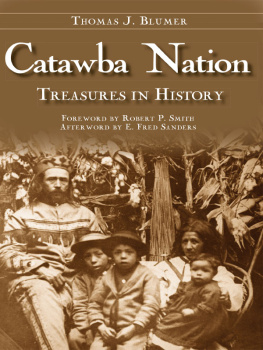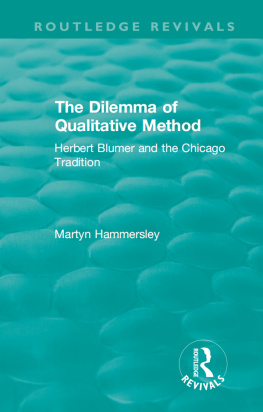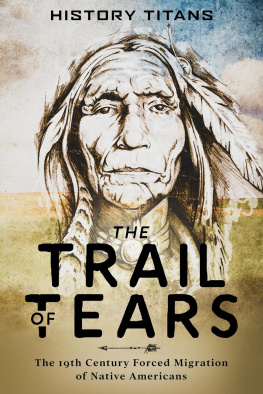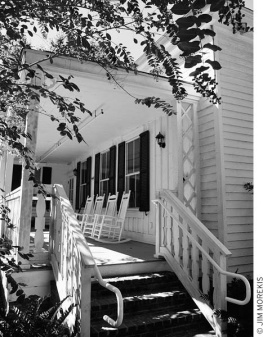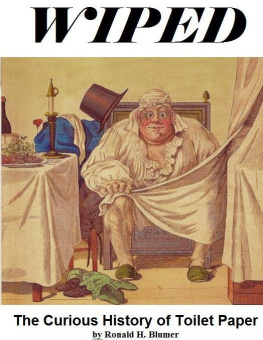
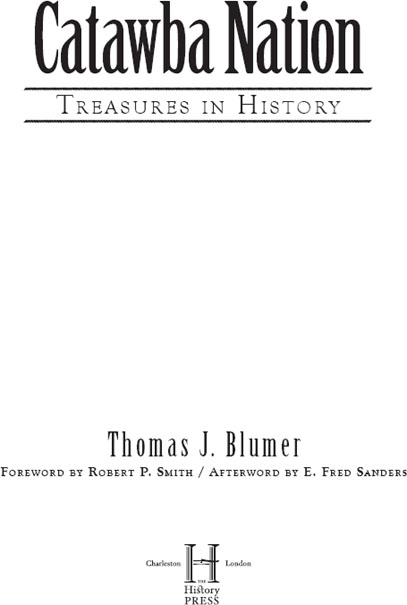
Published by The History Press
Charleston, SC 29403
www.historypress.net
Copyright 2007 by Thomas J. Blumer
All rights reserved
Cover image: The John and Rachel Brown family at the Columbia Corn Exposition in 1913. The children are unidentified.
First published 2007
Second printing 2013
e-book edition 2013
Manufactured in the United States
ISBN 978.1.62584.422.4
Library of Congress Cataloging-in-Publication Data
Blumer, Thomas J., 1937
Catawba Nation : treasures in history / Thomas J. Blumer ; edited with an introduction by Robert P. Smith.
p. cm.
Includes bibliographical references.
print edition ISBN-13: 978-1-59629-163-8 (alk. paper)
1. Catawba Indians--History. 2. Catawba Indians--Wars. 3. Catawba Indians--Government relations. 4. South Carolina--History. I. Smith, Robert P. (Robert Patrick), 1965- II. Title.
E99.C24B575 2006
975.70049752--dc22
2006027436
Notice: The information in this book is true and complete to the best of our knowledge. It is offered without guarantee on the part of the author or The History Press. The author and The History Press disclaim all liability in connection with the use of this book.
All rights reserved. No part of this book may be reproduced or transmitted in any form whatsoever without prior written permission from the publisher except in the case of brief quotations embodied in critical articles and reviews.
Dedicated to my four children:
Theresa Ann Marie Blumer Sahhar
Susannah June Marie Blumer Christenson
Mary Margaret Guadalupe Blumer Chargois
John Jakob Robert Lee Blumer
Contents
Acknowledgements
Catawba Nation: Treasures in History was begun when I was approximately halfway through the transfer of my papers from my home in Edinburg, Virginia, and then later to South Carolina and then from my home here in Lancaster to the University of South Carolina, Lancaster, Medford Library. The odyssey ended, they are now housed in a newly formed archive named the T.J. Blumer Catawba Research Collection. Naturally my reference files had to be reorganized, and this daunting task was brilliantly done by archivist Brent Burgin. As I faced my collection in new surroundings, Burgin was always ready to help me and he became my personal finding aid. Other library personnel who stood ready to help me included head librarian Shari Eliades, Lori Harris (head of public services) and Rose-Ellen (Dafney) Eckberg (government document librarian). I know so many Catawba who are always ready to give of themselves to me and my work of too many years that naming them all would be close to a tribal roll. Those Catawba that I have been in most contact with include Helen Canty Beck, Catawba traditionalist; Sammy Beck, Catawba secretary/treasurer; Anna Brown, Catawba linguist; Keith Brown, master potter and Catawba storyteller; Susan George, Catawba and would-be cousin; Deborah Harris Crisco, Catawba political activist; Jim Largo, Navajo powwow organizer; Della Harris Oxendine, Catawba potter; Cheryl and Brian Sanders, master Catawba potters; Donnie Sanders, Catawba potter; Fred Sanders, Catawba councilman; Bruce Wade, Catawba, who seems to be doubling as a Lakota chief of great notoriety; Gabriel White, Catawba, who has promised to make me some Catawba beads; and a host of others who always encourage me in my ongoing Catawba work with a bit of banter and a hearty smile. Here in Lancaster my major support came from Lindsay Pettus and Sandy Nelson of the Pettus Real Estate Office. The book would have been unthinkable without the help of my editor, Robert Patrick Smith, who is the director of the Catawba Big Head Turtle Productions Project. The project is endeavoring to record, in DVD format, contemporary Catawba pottery-making methods. Lastly, my children call me often and wish me good cheer from various places in Yankee Land, and my dog Sadie is always a foot behind me when I am at home and sits in the window looking for me when I am not.
Foreword
In order to better understand what you are about to read, you should first briefly get to know the man who wrote it. Thomas J. Blumer is a man who has dedicated a large part of his life to a passionate study of a wonderful people, the Catawba Native Americans.
Life began for Tom in Freeport, New York, at 7:00 a.m. on July 7, 1937. He was the seventh child that his parents, Gordon and Viola, looked forward to raising. He had one sister, June Ruth, and a brother, John, who subsequently died at birth. All of Violas other attempts to have a child other then June Ruth ended in tragedy until their son Tom entered the picture.
Toms early education consisted of the public schools of Freeport and catechism at Holy Redeemer Roman Catholic Church. His education continued while he served in the United States Navy from 1956 through 1961. He attended Ole Miss from 1965 through 1968, where he achieved a BA and then an MA in English. In 1970 Tom first had contact with the Catawba and he started his PhD studies. In 1976, the bicentennial of our country, Tom finished his doctorate and started working professionally with the Catawba Nation.
Toms entire childhood was dominated by the church and this pattern continues to this day in his life in Lancaster, South Carolina. Toms major identity is as a Roman Catholic and a Southerner. He has been to Rome five times and will most likely go there a few more times before he throws off this mortal coil. As for the fact that he identifies his life as that of a Southerner, it is true he was born in New York, but he is a Southern gentleman through and through and despises anyone calling him a Yankee. Having lived his entire adult life south of the Mason-Dixon Line, I have to agree: Tom is a Southerner.
Toms first exposure to an American Indian was at Jones Beach, which is not too far from Freeport, where he had the bliss of listening to Princess Rosebud tell Indian stories. Her stories are lost to time, but when asked, Tom describes her as the most beautiful woman that I had ever seen up to the age of five. Toms library of his youth included a little picture book entitled Indians of America. He would spend hours dreaming over the pictures on each page and this is part of the core of Toms love for the Native Americans. As a matter of fact this very same book can be found in the Blumer Archives along with all of Toms other books and papers, located at the University of South Carolina, Lancaster.
Fast forward now to the early 1990s. Tom Blumer was appointed as the official Catawba Tribal historian, a position that lasted until 1998, when Tom left in protest to questionable tribal financial policy that he felt was leading to a disaster for the tribe. During the five years that he held this position, however, he wrote numerous short articles for the Catawba Cultural Centers newsletter. He also gave numerous historical and cultural lectures in the Cultural Center and at the Schiele Museum in Gastonia, North Carolina. Tom was also a regular speaker at the Yap Ye Iswa Catawba Festival. Since all of these duties fell away with his resignation, he looked for a way to stay in touch with the Indians who he served and loved. He had found what he was seeking with The Herald newspaper of Rock Hill. He contacted Mr. Terry Plumb and worked out a contract where he wrote a weekly column that appeared every Thursday. Since Tom has long lived and breathed Catawba history, coming up with weekly topics did not present a problem. Tom documents everything and many times he turned to the past transcripts of his weekly radio program that he had done for WFRM radios
Next page
